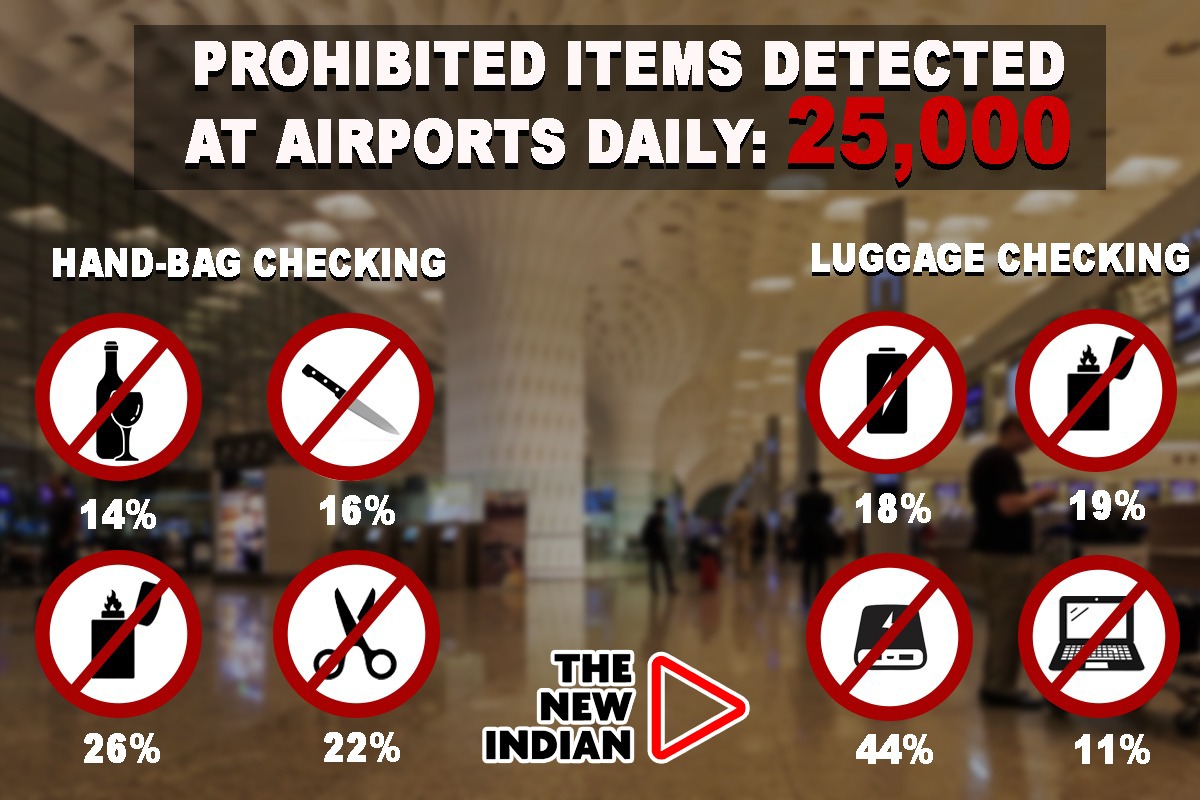NEW DELHI: Airport security in India is facing an ever-increasing challenge as the number of prohibited items being detected at airports continues to rise. On an average day, airport screeners discover around 25,000 prohibited items hidden in passengers’ luggage. These items include lighters, scissors, knives, nail polish, shampoo, lotion, (liquid), power banks, and laptops, among others. The Bureau of Civil Aviation Security (BCAS) reports that the most commonly detected items are lighters (26%), scissors (22%), knives (16%), liquids (14%), power banks (44%), lighters (19%), loose batteries (18%), and laptops (11%). The detection of these items is carried out through the use of Door Frame Metal Detectors (DFMD) and other X-ray machines.

It is not entirely clear why these prohibited items are being brought into airports. Some passengers may have unknowingly packed these items in their luggage, while others may have more nefarious intentions. Regardless of the reasons behind it, the increase in prohibited items poses a significant challenge for airport screeners, who must remain vigilant in their efforts to ensure passenger safety and security.
Zulfiquar Hasan, DG of BCAS, highlights security awareness for first-time flyers. He underscores the significance of full-body scanners at airports, reports @AlokReporter. #AirportSecurity #FullBodyScanners #FirstTimeFlyers pic.twitter.com/YFrLqhOveV
— The New Indian (@TheNewIndian_in) July 31, 2023
BCAS Director General Zulfiquar Hasan has stressed the importance of passengers adhering to airport rules and regulations to create a strong and effective aviation security culture.”Securing our skies is a paramount priority for BCAS, and we are steadfast in fostering a robust and effective aviation security culture. Security is a collective responsibility, encompassing screeners, cleaners, industry leaders, frontline workers, taxi drivers, and airport retail staff alike. This airport belongs to all of us, and each individual has a crucial role to play,” he emphasized.
Hasan urges passengers to be aware of their role in ensuring airport security and to cooperate with screeners during security checks. “I earnestly urge all passengers to comply with the airport rules. As we progress through this week, my hope is for a stronger and pervasive security culture to take root at the airports,” Hasan added.
Zulfiquar Hasan, DG of Bureau of Civil Aviation Security, confirms the procurement of body scanners for enhanced airport security in response to @AlokReporter's question. #AirportSecurity #BodyScanners #AviationSafety pic.twitter.com/HWgvDCz3i4
— The New Indian (@TheNewIndian_in) July 31, 2023
To further enhance airport security, BCAS has announced plans to install full-body scanner machines at major airports across the country. These machines will play a crucial role in detecting prohibited items hidden inside passengers’ bodies, which cannot be detected by DFMDs. The installation of these advanced scanners is seen as a positive step in the ongoing fight against terrorism and other threats to aviation security.
With approximately 11,000 screeners deployed at security checkpoints, Indian airports screen around 5 lakh departing passengers and 9 lakh handbags every day. To support the efforts of screeners, around 600 baggage x-ray machines and 1000 DFMDs are currently deployed at airport security checkpoints.
Director General Zulfiquar Hasan stated that the implementation of full-body scanners would occur in phases, with major airports like Mumbai, Delhi, and Bengaluru being the first to receive these machines. He expects the installation process to be completed within one and a half years. Hasan also highlights ongoing efforts to reduce the time required for security checks and frisking procedures, aiming to streamline the process and enhance passenger experience.
Addressing the issue of congestion witnessed at Delhi’s Indira Gandhi International (IGI) Airport last year, Hasan assures that security checkpoint capacity has been increased in most airports. He expresses hope that this proactive approach will prevent a recurrence of such congestion during the festive season. As the aviation industry continues to evolve, the commitment to strengthening airport security remains a top priority for BCAS and its stakeholders.










